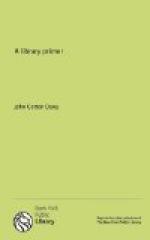A free reading room is generally opened in connection with the library, and often proves its most attractive feature. It should be comfortably furnished and scrupulously clean. As the room is for the use of all clean and orderly people, quiet should be maintained to give all a chance to read and study without interruption. There should be no signs commanding things, and the fewest possible—and they unobtrusive—requesting things. Signs giving information helpful to readers are always permissible; but see that they harmonize with the furnishings of the room and are clean. Gray, or some modest tint, is preferable to white cardboard for all signs. The general atmosphere of the place should be such as one would wish to have in his own home—orderly, inviting, cheerful.
The village library ought to preserve for reference a file of local papers; and it seems proper for it to provide for public use a few dailies or weeklies from the nearest cities. Further than this in this direction it would not seem expedient to go, because better work can be done, with the money newspapers would cost, in other directions. In fact, where the room is limited, as well as funds, it will often be better to provide no newspapers at all. Few are unable to get papers to read elsewhere. The library can well devote itself to the encouraging the reading of other things. Most people read the newspapers enough, library or no library. Many, save for the library, would not read the standard American and English periodicals.
[Illustration: Magazine binder. (Reduced; various sizes.)]
The young people are the library’s most hopeful material. To them the librarian hopes to give, through books and journals, an added pleasure; and in them he hopes to awaken a taste for reading something—in time something good. To attract the children it will be wise to have on file a few juvenile journals and picture papers and illustrated magazines. As to the standard and popular monthlies and quarterlies there seems to be no question; they should be taken freely. The magazines furnish us with the best fiction, the best poetry, the best essays, the best discussions of all subjects, old and new, and the latest science. It is a question if many a village library would not do more, vastly more, to stimulate the mental life of its community, and to broaden its views and sympathies, and to encourage study, if it diverted a far larger part of its income than it now does from inferior books, and especially inferior novels, to weekly journals and popular and standard magazines. It is not yet fully impressed upon us that the thing the community needs is not a “library”—it may have a street lined with “libraries” and still dwell in the outer darkness—but contact with the printed page. Get this contact first, then, by means of attractive rooms, and clean, wholesome, interesting periodicals and books, and let the well rounded students’ collection of books come on as it will.




